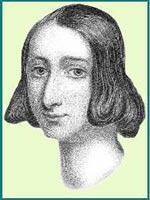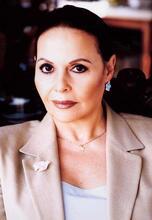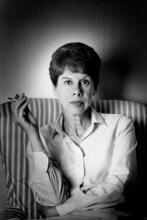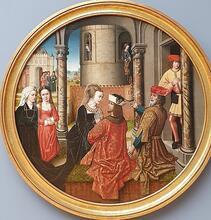Dorothea Mendelssohn Schlegel
The daughter of German-Jewish philosopher Moses Mendelsohn, author Dorothea Schlegel, née Brendel Mendelsohn, abandoned her father's religion, the husband he had chosen, and even the name he had given her at birth, to marry the controversial Christian literary theorist Frederick Schlegel.
Institution: Gidal-Bildarchiv im Salomon Ludwig Steinheim-Bildarchiv für deutsch-jüdische Geshichte e.g., Duisberg
Dorothea Mendelssohn Schlegel, the eldest daughter of Moses Mendelssohn, was an author and editor whose work received little recognition during her lifetime. While married to Simon Veit, she became active in Berlin’s dynamic salon subculture, and in 1794 she began calling herself Dorothea rather than her given name of Brendel. In 1799 she fell in love with the controversial writer Friedrich Schlegel and divorced Veit that same year. Her relationship with Friedrich alienated Dorothea from her family; the couple left Berlin and travelled to Jena, Paris, and Cologne before settling in Vienna, where they married and converted to Catholicism in 1808. The two decades spent in Vienna were Dorothea’s happiest. Under Friedrich’s name, Dorothea published her only novel Florentin in 1799, and her edited volumes of medieval French texts in 1802.
The life of Dorothea Schlegel was dramatic, sometimes painful, and full of ironies. This intelligent and spirited woman entered the world as the eldest daughter of the pride of the European Jewish Enlightenment; European movement during the 1770sHaskalah, Moses Mendelssohn. Like three others of the six Mendelssohn children, in time she left Judaism behind. But her departure from Judaism and from her family was the most profound. She divorced the Jewish husband her parents had chosen for her. Later she converted to become a Lutheran and married Friedrich Schlegel, a literary scholar. Four years after their marriage, both Dorothea and Friedrich became Catholics.
Dorothea Schlegel was an industrious author, editor, translator, and reviewer. But because she never signed her writings with her own name, she gained little recognition during her lifetime. Moreover, her life story attracted more attention than her work. Today, we should rejoice that her publications have come back into print and have received greater critical appreciation.
Early Life & Education
Dorothea Schlegel began her life as Brendel Mendelssohn on October 24, 1764. When she was born her father, Moses Mendelssohn (1729–1786) was 35 and employed as a bookkeeper for a silk factory. For a decade Mendelssohn had been publishing books and essays in German, and he had already begun to be recognized with major academic prizes. He and his wife Fromet (1737–1812) ultimately became the parents of five more children.
It was once thought that Brendel benefited from an “exceptional private education” as Moses Mendelssohn’s daughter. But in truth we do not really know how often Brendel and her younger sisters attended the classes Mendelssohn taught at home for a circle of young Jews. We do know that she was taught to speak and write German and that she was an avid reader of contemporary novels and history.
Although her mother Fromet was rather well educated for the time, as she came into her teen years Brendel’s absorption in modern literature and her disdain for traditional ritual led to conflict between mother and daughter. As a young girl, Brendel was lucky in friendship, her closest friends being her sister Henriette (1768–1831), Jeanette Ephraim (1764–1840), Henriette Herz (née de Lemos, 1764–1847), and Rahel Levin (1771–1833), who married Antonie Frederike Varnhagen von Ense. When they were in their teens, the girls in this circle shared a passion for avant-garde German literature. When they were growing up in the 1770s few would have imagined how far they would eventually travel away from the Jewish world into which they were born.
Marriage to Simon Veit
When she was fourteen, her parents arranged Brendel’s engagement to Simon Veit (1754–1819), who was then 24. They were married four years later. Both sets of parents were pleased with the match. Veit was born into an immensely influential Berlin family, who were proud to secure an affiliation with the Mendelssohns. Although they were definitely not wealthy and Brendel’s dowry was modest, her family had immense intellectual prestige.
Mendelssohn died three years after Brendel was wed, convinced that his daughter’s marriage was happy. As the years passed, the couple’s friends were divided, some thinking that the marriage was contented and others worried about Brendel’s happiness. Death and dislocation deprived the young couple of a wider extended family. Three years into their marriage each lost a father. And two years later Fromet and the younger siblings left Berlin to live in Mecklenburg-Strelitz.
With considerable difficulty, Brendel and Simon brought into the world four sons, two of whom, Jonas (1790–1854) and Philipp (1793–1877), survived. For the fifteen years of their life together, during the 1780s and 1790s, Brendel was active in Berlin’s dynamic salon subculture. She organized a small reading club and attended Henriette and Markus Herz’s (1747–1803) double salon, and together with Wilhelm (1767–1835) and Alexander von Humboldt (1769–1859), she helped found a secret society called the Tugendbund. She wore her hair loose without either a wig or a bonnet. In 1794 Brendel began calling herself Dorothea.
Affair with Friedrich Schlegel & Divorce
In the summer of 1797, when she was 33, Dorothea first met the writer Friedrich Schlegel (1772–1829). He was then an attractive and accomplished young man of 25. Although his family intended him to become a banker, he disdained commerce and was fast making his name as a literary critic and theorist. His older brother August Wilhelm (1767–1845) was an influential professor at the University of Jena.
Friedrich and Dorothea Veit fell in love and apparently became lovers. Dorothea pondered long and hard about whether she should divorce Simon Veit. Ultimately she decided she would, telling her friends that her marriage had felt like “slavery.” The divorce was granted in 1799. Simon was given custody of the older boy, Jonas. But Dorothea was allowed to raise Philipp, who was then six, until he was thirteen, 400 thaler a year, which would restrict her to a far more modest lifestyle than she had ever known.
She was to lose much more after the divorce. She lost her right to live in Berlin, she lost intimacy with her siblings, and her relationship with her mother ended altogether. Perhaps less predictably, Dorothea even lost many of her Christian friends. Friedrich Schlegel’s 1799 novel Lucinde was seen as dangerously sexual even among their circle of liberal friends.
Conversion to Catholicism
In 1799 the couple, still unmarried, moved to Jena with Philipp. There Friedrich taught at the University of Jena and they lived in the home of August Wilhelm Schlegel and his wife Caroline Michaelis Schlegel. This was a lively setting, where young romantic intellectuals gathered. But after a time Dorothea and Caroline quarreled, and indeed the adventurous lifestyle of the entire circle went awry. Marriages collapsed and children died and the men involved quarreled over love, literature, and university politics. It was while she was in Jena that Dorothea published her only novel, Florentin, under Friedrich’s name.
Three years later, in 1802, Dorothea and Philipp and Friedrich moved to Paris, hoping to find intellectual fulfillment and a secure income. Since the secure income continued to prove elusive, she began editing volumes of medieval French texts, all published under his name. It was in 1803 in Paris that her already brittle relationships with her family deteriorated further. Her siblings Abraham (1776–1835) and Henriette Mendelssohn were then living in Paris. Dorothea assured them that she was planning to leave Friedrich and on those grounds requested that she receive her share of the family inheritance even before her mother died. Abraham and Henriette did not believe her and refused. Their hostility to Friedrich Schlegel may have been more salient in this refusal than their disapproval of Dorothea’s rejection of Jewish life. Indeed, several years later both Abraham and Henriette would themselves convert. A year later, on April 6, 1804, Dorothea became a Protestant and she and Friedrich married.
Soon after their marriage the couple, together with Philipp, moved again, this time to Cologne. These were Dorothea’s loneliest years. Friedrich still found no stable employment, he was no longer passionately in love with her, and he traveled a good deal. Philipp returned to Berlin in 1806 to live with his father. Friedrich was becoming more Catholic in his orientation and hoped that a Catholic baptism might open up career possibilities. We know little about Dorothea’s spirituality at this juncture. They became Catholics together in Cologne on April 16, 1808, almost four years to the day after she had become a Protestant. In time Dorothea would become a quite fanatical Catholic.
Settling in Vienna & Making Peace with Her Family
Two years later we find our couple in Vienna, and thus began the happiest two decades in Dorothea’s life. For a time Friedrich found employment in the Austrian state service. She was re-united with her childhood friend Fanny von Arnstein (1757–1818) who hosted an opulent salon in Vienna. Very much unlike Dorothea or most of her childhood friends from Berlin, the stupendously wealthy Fanny found a way to remain Jewish and to mix in prominent noble circles. During Dorothea’s Vienna years, in 1810, much to their father Simon’s distress, both of the Veit sons converted. They settled in Rome and made names for themselves as painters in the Catholic Nazarene style. Indeed Dorothea spent two happy years living in their artistic commune in Rome in the late 1810s. She returned to Vienna in 1820, where the couple lived until Friedrich died in 1829. She spent her last decade in Frankfurt, living in the home of her son Philipp and his family. She died at 74 on August 3, 1839.
Toward the close of her life Dorothea tried to make peace with her family, with some success. Before Simon Veit died in 1819, she asked for his forgiveness for wrongs she had done to him during and after their divorce. Ironically, he was more tolerant of the baptisms of his wife and children than Dorothea was of her intimates who remained Jewish or were Protestant. Her evolution into a fervent Catholic also alienated her from the younger writers of the day, including Heinrich Heine (1797–1856), who were seeking the same freedom from establishment constraints that she herself sought in earlier days. After Friedrich died, leaving behind debts rather than assets, her brothers made their peace with Dorothea and supported her generously. Her nephew Felix Mendelssohn (1809–1847), Abraham’s talented son, admired her greatly and they were very intimate.
Dorothea Mendelssohn Schlegel’s life teaches us that however much Mendelssohn can be admired as an intellect and as a founder of various Jewish paths into modernity, his legacy did not pass easily to his own children, who tended to drift away from Judaism as they came into adulthood. Whether or not their rejection of Judaism brought them personal happiness is a mystery we must continue to ponder.
Selected Works
Florentin. Edited by Friedrich Schlegel. Lübeck and Leipzig: 1801.
A new edition of the novel was published, edited by Liliane Weissberg: Florentin. Roman, Fragmente, Varianten. Frankfurt am Main: 1987.
Translations by Dorothea Mendelssohn Schlegel
(All works appeared under the name of Friedrich Schlegel)
Geschichte der Jungfrau von Orleans. Berlin: J.D. Sander, 1802
Autobiographie der Margaretha von Valois. Leipzig: Junius, 1803
Geschichte des Zauberers Merlin. Leipzig: Junius, 1804
Margareth von Valois, Lother und Maller. Eine Rittergeschichte. Frankfurt am Main: 1805.
Correspondence of Dorothea Mendelssohn Schlegel
Behler, Ernst, editor. Kritische Friedrich-Schlegel Ausgabe. Abteilung III. Briefe von und an Friedrich and Dorothea Schlegel. Paderborn: Ferdinand Schoningh, 1980
Gilbert, Felix. Bankiers, Künstler und Gelehrte. Unveröffentliche Briefe der Familie Mendelssohn aus dem 19. Jahrhundert. Tübingen: J.C.B. Mohr, 1975
Körner, Josef. Briefe von und an Friedrich und Dorothea Schlegel. Berlin: C.A. Kindle, 1926
Raich, J.M., editor. Dorothea von Schlegel geb. Mendelssohn und deren Söhne Johannes und Philipp Veit. Briefwechsel. Mainz: 1881.
Abt, Harry. “Dorothea Schlegel bis zu ihrer Vereinigung met der deutschen Romantik.” Ph.D. dissertation, Frankfurt: 1924
Deibel, Franz. “Dorothea Schlegel als Schriftstellerin im Zusammenhang mit der romantischen Schule.” Palaestra 40. Berlin: Mayer & Müller, 1905
Dick, Jutta and Marina Sassenberg, eds. Jüdische Frauen im 19. und 20. Jahrhundert. Lexikon zu Leben und Werk. Reinbeck bei Hamburg: Rowohlt, 1993
No Author. Die Mendelssohns in Berlin. Eine Familie und ihre Stadt. [Catalogue] Berlin: 1983
Frank, Heike. ‘…Die Disharmonie, die mit mir geboren ward, und mich nie verlassen wird …’ Das Leben der Brendel/Dorothea Mendelssohn-Veit-Schlegel. Frankfurt/Main–Bern: Peter Lang, 1988
Hensel, Sebastian. Die Familie Mendelssohn 1729–1847. Nach Briefen und Tagebüchern. Three volumes. Berlin: B. Behr, 1886
Hertz, Deborah. Jewish High Society in Old Regime Berlin. New Haven and London: Yale University Press, 1988
Hibbert, J. “Dorothea Schlegels Florentin and the Precarious Idyll.” German Life and Letters 30 (1977): 198-207.
Hiemenz, Margareta. Dorothea v. Schlegel. Freiburg: Herder, 1911
Kayserling, Meyer. Die jüdische Frauen in der Geschichte, Literatur und Kunst. Leipzig: Arno Press, 1879
Reprint, Hildesheim, Zürich and New York: N.p., 1991
Kilcher, Andreas. Metzler Lexikon der deutsch-jüdischen Literatur. Stuttgart and Weimar: J.B. Metzler, 2000
Lorenz, Dagmar. Keepers of the Motherland. German Texts by Jewish Women Writers. Lincoln and London: University of Nebraska Press, 1997
Schäfer, G. “Zur Konversion von Friedrich und Dorothea Schlegel.” Begegnung. Zeitschrift für Kultur und Geistesleben. Heft 2. (1947)
Stern, Carola. “Ich möchte mir Flügel wünschen.” Das Leben der Dorothea Schlegel. Reinbeck bei Hamburg: Rowohlt, 1990
Stuebben Thornton, Karin. “Enlightenment and Romanticism in the Work of Dorothea Schlegel.” The German Quarterly 39 (1966): 162-172.
Weigert, Astrid. “Schriftellerinnen als Aesthetikerinnen: Genre und Geschlecht in Romantik und Naturalismus am Beispiel von Dorothea Schlegel und Else Bernstein.” Ph.D. dissertation, Georgetown University: 1999
Weissberg, Liliane. “Schreiben als Selbstentwurf. Zu den Schriften Rahel Varnhagens und Dorothea Schlegels.” Zeitschrift für Religions und Geistesgeschicht. 47 (3) 1995: 231–253.















